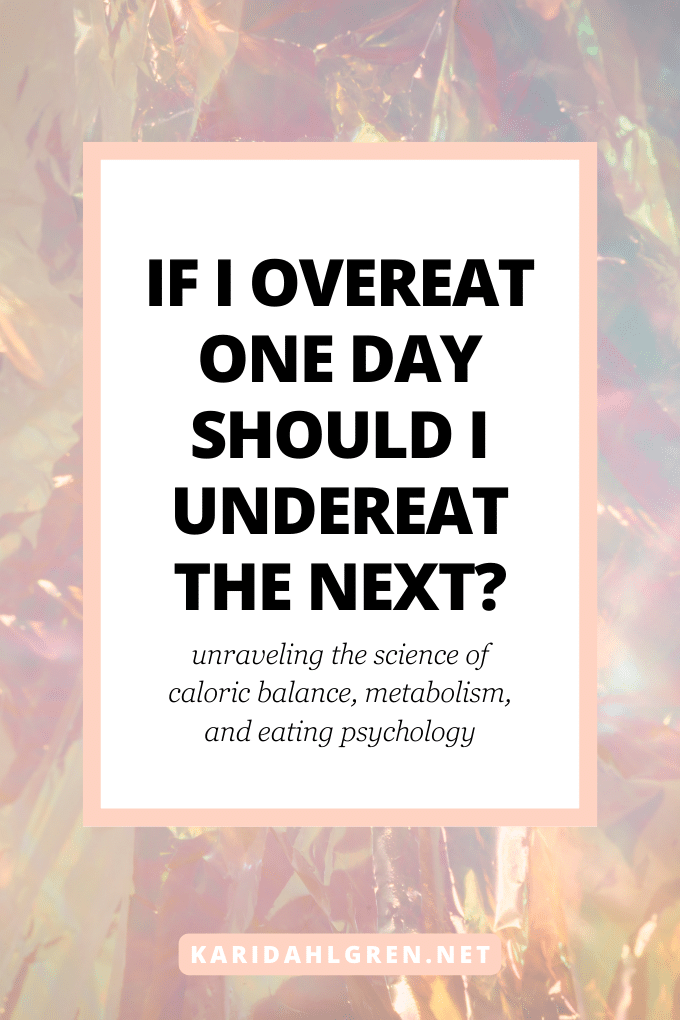
It can be quite the dilemma: If I overeat one day, should I undereat the next? While this question about over- and undereating may seem to have a simple yes-or-no answer, the reality is complex. It’s important to look at your biological and psychological response to restriction to determine the best course of action the day after a binge.
To give you a little taste of what’s in store, the short answer is no, overeating should not be compensated by an “equal” amount of undereating. The body employs biological responses to restriction that actually increase the likelihood of weight gain and further overeating.
Since most people struggling with overeating want to prevent weight gain, it’s important to understand what’s really going on. You’re about to learn how your metabolism changes when you respond to overeating with undereating and how to navigate the day after a binge with grace.
The Dilemma: If I Overeat One Day, Should I Undereat the Next?

On the surface, it seems reasonable to compensate for overeating by undereating the following day. However, this mindset oversimplifies your body’s complex biological processes and can actually harm your metabolism, potentially resulting in weight gain, not weight loss.
The concept of caloric balance is at the heart of the question, “If I overeat one day should I undereat the next?” Many of us are taught that maintaining weight simply involves balancing the calories you consume with the calories you burn. However, our bodies are far more complex than simple mathematical equations.
The concept of weight loss through “calories in, calories out” neglects many other factors, such as the thermic effect of food (the energy your body uses to digest food), the quality of the food you eat, and even the impact of stress and sleep on your metabolism.
Your body is wired to adapt. When you undereat the day after overeating, your body might adjust its metabolic rate (more on this soon) to reduce the number of calories you burn.[1]
From an evolutionary perspective, undereating is synonymous with famine, and those who retained body fat during periods of famine were the ones who survived.[2] At a biological level, we are wired to prioritize weight gain during times of famine—and to your body, undereating is synonymous with famine.
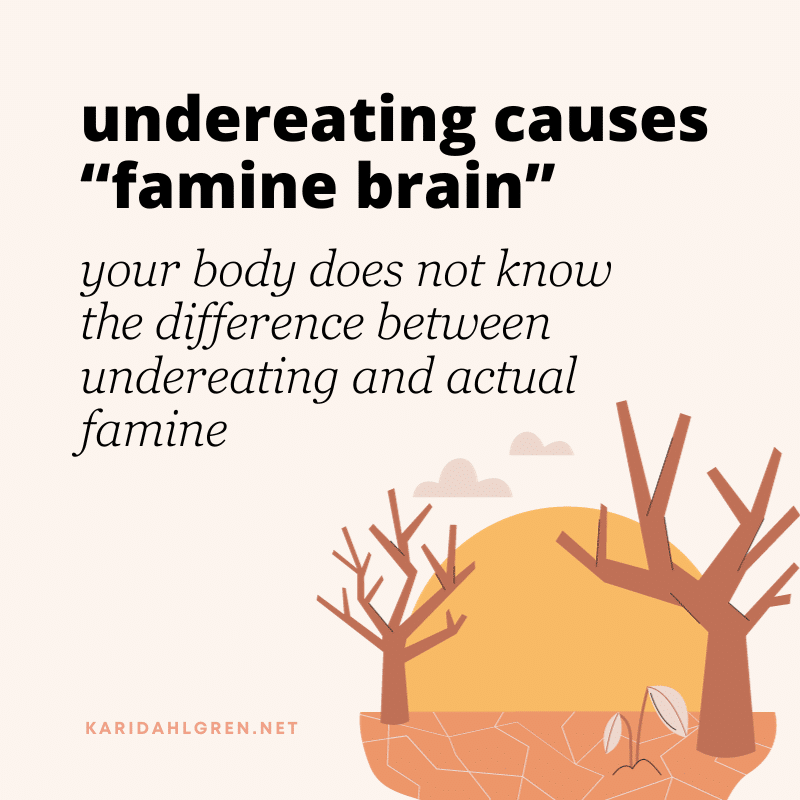
Therefore, undereating the day after overeating doesn’t necessarily mean you’ll “balance out” the extra calories consumed. In fact, you’re about to learn how undereating the day after overeating actually tips the scale in the opposite direction: it predisposes you to weight gain, not weight loss.
Overeating and Undereating: The Impact on Metabolic Cycles
Let’s dive deep into that word: metabolism. Most of us relate to metabolism as something we want to speed up, but there’s much more to it than that.
Metabolism is responsible for converting food into energy. It has two primary modes: fed (anabolic) and fasted (catabolic).[3] For the sake of simplicity, let’s nickname the fed state as “Building Mode” and the fasted state as “Energy Release Mode.”
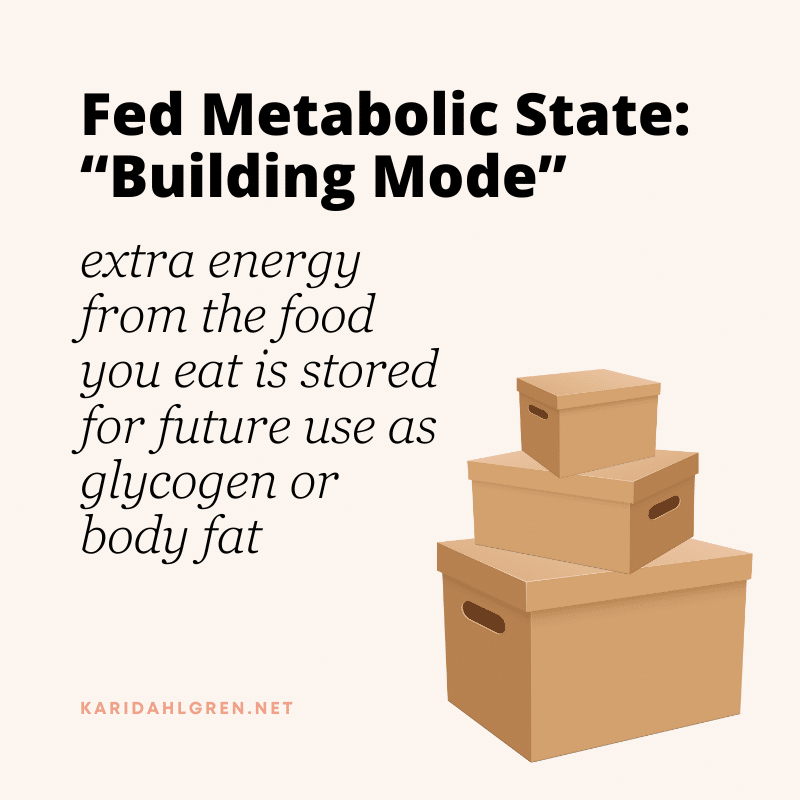
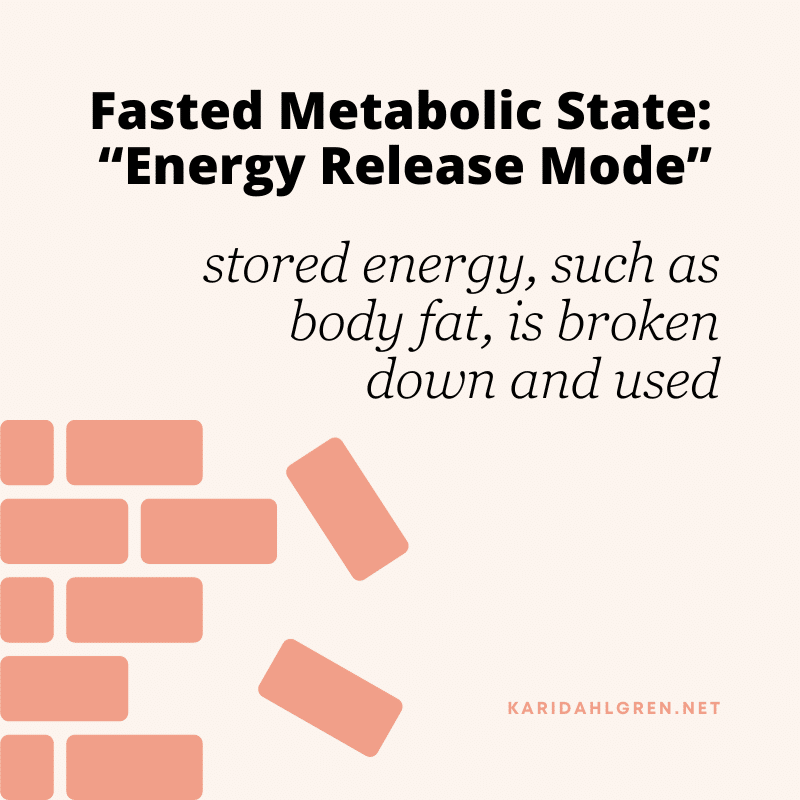
During the fed metabolic state, or “Building Mode,” your body digests the food you consume and excess calories are stored for future use. One of the primary ways the body stores energy is adipose tissue, which is one of the benefits of body fat: it stores energy for later use.
On the other hand, during the fasted state, or “Energy Release Mode,” your body uses these stored energy sources. During the fasted state, your body breaks down stored energy, which can include breaking down body fat.
Perhaps you’re familiar with the fasted state from intermittent fasting, where one of the mechanisms that leads to weight loss is the “Energy Release Mode” that’s activated during fasting. However, like most diets, it just doesn’t work long-term.[4]
For every restriction, there is an equal and opposite binge. When we “fall off the wagon” and overeat or binge while we are on a diet, we may be tempted to restrict our diet the following day—thus the question that inspired this article: “If I overeat one day should I undereat the next?”
But when we drastically alter our calorie intake from day to day, it disrupts the body’s metabolic cycles. Overeating one day and undereating the next can cause adaptive thermogenesis, which causes the body to reduce energy-burning and favor weight gain over weight loss.[5]
Adaptive Thermogenesis Explained: When You Overeat One Day and Undereat the Next
Metabolic changes happen when your body responds to unpredictable calorie intake. When you overeat one day and undereat the next, your body may struggle to regulate its energy balance efficiently.
This can lead to unstable energy and potentially affect your metabolic rate—especially under sever calorie restriction.[6] In other words, overeating one day and undereating the next can slow down your metabolism and potentially lead to weight gain and feelings of lethargy.
When you undereat, your body adapts your metabolic rate to conserve energy —a process known as adaptive thermogenesis or metabolic adaptation. This means that your body becomes more efficient at using energy, leading to fewer calories burned overall.[1], [5], [7]
Ironic, isn’t it? We restrict our diet to hopefully avoid weight gain, but biological responses to calorie restriction actually hinder our ability to lose weight.
The body is wired to prefer weight gain, not weight loss—and creating instability in your eating behavior tips the scale in favor of weight gain.[8], [9]
Your body will rigorously defend its set point weight—your “natural weight” or size your body is comfortable with—and if you continue to respond to overeating with undereating, your set point weight may become higher.[10]
Beyond Metabolism: The Impact on Hormones & Psychology
The mindset of “I overate yesterday, so I should undereat today” can foster a diet mentality, characterized by restriction, preoccupation with food, depression, and poor body satisfaction.[11] This can lead to a vicious cycle of depression, continued dieting, and weight cycling (continuously gaining and losing weight) which is linked to poorer health.[12]
Furthermore, undereating can also have significant impacts on your hunger and satiety hormones. Levels of ghrelin, also known as the “hunger hormone,” can increase when you’re not eating enough, while levels of leptin, the “satiety hormone,” can decrease.[13]
As your body ramps up cravings, it’s likely to ask for high-calorie or “hyperpalatable foods” — those high in fat, salt, sugar, or carbs—during periods of restriction.[14] These hormonal shifts can make you feel hungrier—even after eating—leading to potential overeating, even if you’re trying to compensate for overeating by undereating.
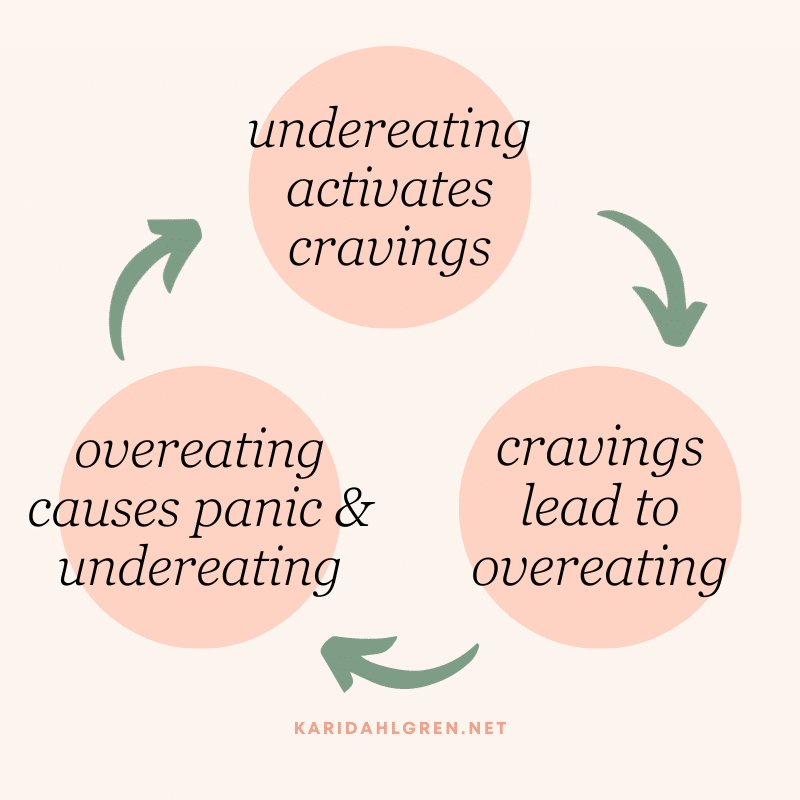
Also, the feeling of deprivation that comes from undereating can affect us psychologically. Studies have shown that when we make certain foods off-limits, we think about them and want them more—and we are even more likely to binge on them.[15], [16]
Many of us restrict our diet in order to lose weight, but the body’s response to restriction actually encourages the opposite effect. Therefore, by giving up dieting, you can save time, energy, and your mental health – since you’ll ease feelings of self-defeat that stem from the restrict-binge cycle.
By letting go of restrictive dieting and undereating, we free ourselves from the restrict-binge cycle, put an end to unwanted changes in metabolism, and reap the benefits of improved physical and mental health.[17] Best of all, we reap the benefit of stabilizing our weight and, from that place of safety and balance, maybe even settling upon a lower set point weight—eventually.
Wondering how to break the cycle of overeating and undereating? Take my quick quiz to uncover your unique eating psychology strength and foster a healthier relationship with food. Click here to take the quiz.
Giving Up Dieting as a Potential Answer to: If I Overeat One Day Should I Undereat the Next?
Dieting implies a temporary change in eating habits, usually involving restriction, deprivation, and a preoccupation with the number on the scale. This perpetuates the overeating-undereating cycle we’re trying to avoid.
Instead, you can replace dieting with a focus on nourishing your body rather than just losing weight. However, many of us are worried that if we don’t follow a diet then we will end up craving carbs and sugar and binge on these “bad” foods. This is far from the truth!
What happens when you stop dieting is complex. It may initially begin with episodes of indulging in previously forbidden foods. But after that stage, a healthier relationship with food emerges.
Here is my YouTube video where I explain the stages of giving up dieting so that you know generally what to expect:
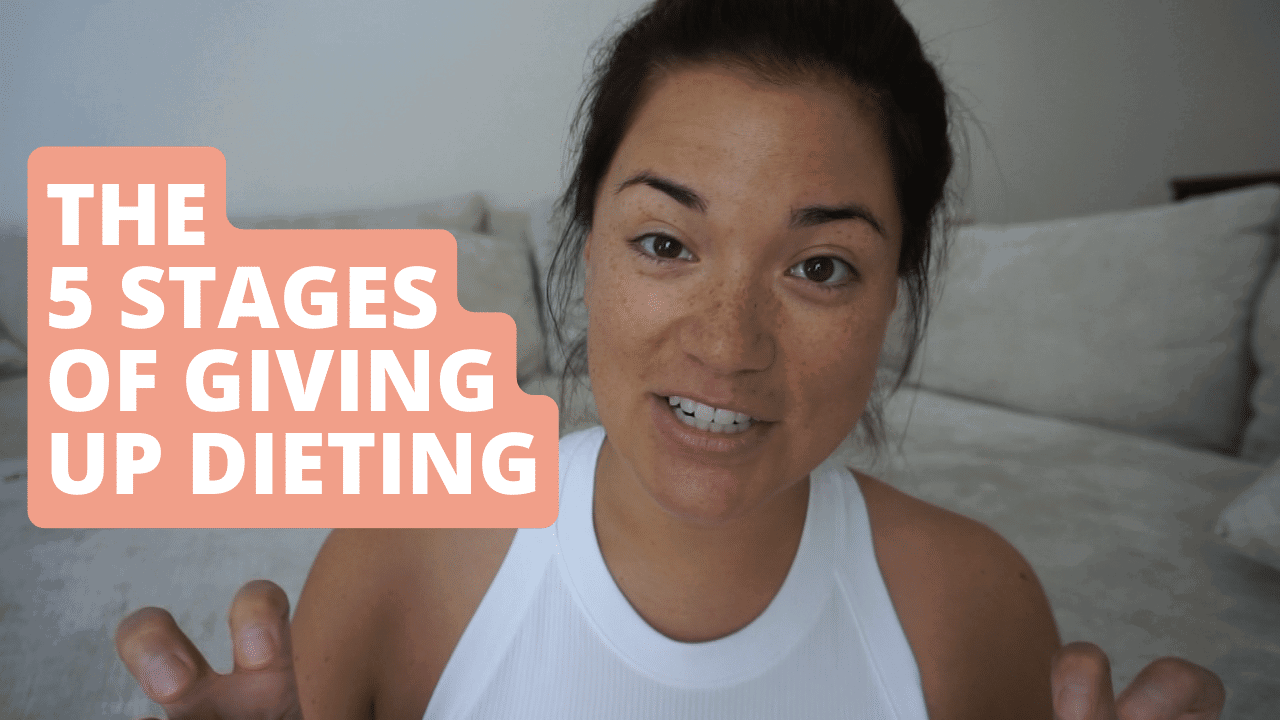
Redeveloping trust in yourself around food can be difficult and scary, but it’s far more helpful than remaining in the restrict-binge cycle for years and years.
If you’re genuinely hungry, eat. When you’re satisfied, stop eating. If you can’t get yourself to stop eating when you’re full, use emotional eating tools such as the Stop, Drop, & Feel, my trademark method for stopping compulsive eating.
Occasional indulgences are a normal and enjoyable part of life—they're not something to feel guilty about or to compensate for with restrictive behaviors.
Having days where you eat more than usual is perfectly okay and does not need to be "undone" by undereating the next day.
Remember that your body will rigorously defend its set point weight. There’s no need to compensate for a day of overeating with a day of undereating—all you need to do is listen to your body’s signals.
Return to listening to your body to inform what you eat without guilt or stress. Ultimately, it’s the overall pattern of your eating habits, not one single day of overeating, that contributes to your health and wellbeing.
Balance and Consistency Over Compensation
I hope this article helps you give yourself more credit. Your body is not a simple calculator doing “calories in, calories out” math. It’s complex and automatically adjusts to changes in your diet through your metabolism, hormones, and even psychology.
Ditching diet culture is the ultimate answer to, “If I overeat one day should I undereat the next?” Shift from food restriction to prioritizing nourishment. Break free from the restrict-binge cycle by redeveloping trust in your body’s ability to regulate itself so long as you keep trying to listen to it.




Thank you for writing this in simple terms.
I’m so glad you found it easy to follow—that’s always my goal. Thank you taking the time to share!